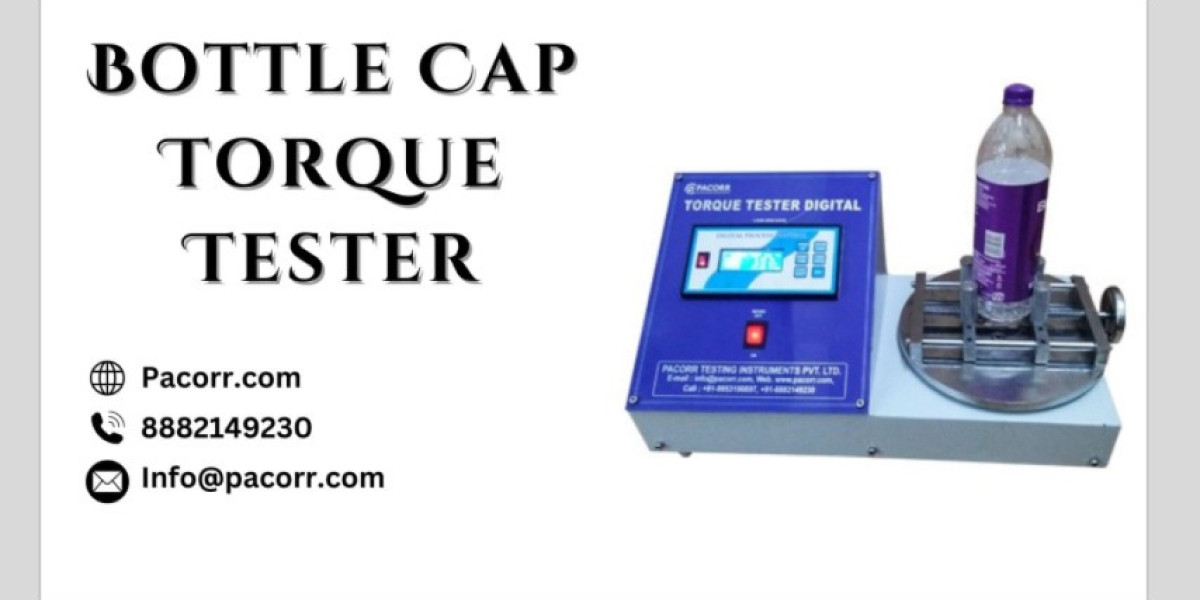One tool that plays an essential role in achieving this is the Bottle Cap Torque Tester. At Pacorr.com, we understand the importance of precision and reliability, which is why we are committed to providing high-quality solutions for your packaging needs.
This article explores the ins and outs of bottle cap torque testing, its significance, the features of modern torque testers, and why you should consider incorporating this tool into your production process.
What Is a Bottle Cap Torque Tester?
A Bottle Cap Torque Tester is a specialized device used to measure the torque or rotational force required to open or close the cap of a bottle. This ensures that the cap is neither too loose nor too tight, preventing potential problems such as:
- Leakage
- Product spoilage
- Customer dissatisfaction
Why Is Bottle Cap Torque Testing Important?
Ensuring the proper application torque on bottle caps is essential for both consumer safety and operational efficiency. Here’s why:
- Leak Prevention
Proper torque ensures a tight seal that prevents liquid products from leaking during transport or storage. - Product Integrity
The correct torque prevents contamination, especially in industries like pharmaceuticals and food, where sterility is paramount. - Compliance with Industry Standards
Many industries have stringent standards for packaging. Bottle cap torque testing ensures compliance with these requirements. - Customer Satisfaction
An improperly sealed Bottle Cap Torque Tester Manufacturers can be difficult to open or may result in spills, negatively affecting the customer experience. - Cost Savings
Identifying torque inconsistencies during production reduces waste and the risk of recalls due to defective packaging.
How Does a Bottle Cap Torque Tester Work?
A bottle cap torque tester is straightforward yet highly effective. Here’s how it works:
- Setup
The bottle is secured in the tester's clamp or fixture to prevent movement. - Testing
The cap is manually or automatically rotated. The tester measures the force applied, which is displayed in units like Newton-meters (Nm) or pound-inches (lb-in). - Analysis
The readings are analyzed to ensure they fall within the acceptable range for the specific bottle and cap type.
Modern torque testers often feature digital displays, data logging, and connectivity options, making them versatile and user-friendly.
Features to Look for in a Bottle Cap Torque Tester
When choosing a Bottle Cap Torque Testing, consider the following features to ensure maximum efficiency and reliability:
- Accuracy
Precision is critical. Look for testers with high accuracy to ensure consistent results. - Ease of Use
Tools with ergonomic designs and intuitive interfaces make the testing process smoother. - Adjustability
A tester that accommodates different bottle and cap sizes is ideal for diverse product lines. - Data Logging
Many testers come equipped with software or onboard memory to store and analyze test results. - Durability
High-quality construction ensures the tester withstands repeated use in industrial environments. - Calibration Features
Regular calibration ensures the tester maintains its accuracy over time.
Applications of Bottle Cap Torque Testers
Bottle cap torque testers find applications in various industries, including:
- Food and Beverage
Ensures bottles are sealed to preserve freshness and prevent leaks. - Pharmaceuticals
Protects the sterility and integrity of medicines. - Cosmetics
Prevents spillage and maintains product quality. - Chemical Industry
Ensures safe packaging of potentially hazardous substances. - Automotive Fluids
Guarantees a secure seal for products like engine oils and coolants.
Best Practices for Using a Bottle Cap Torque Tester
To get the most out of your Bottle Cap Torque Tester price, follow these best practices:
- Regular Calibration
Periodically calibrate the tester to maintain accuracy. - Test Multiple Samples
Test a representative sample from each production batch for reliable data. - Follow Manufacturer Guidelines
Adhere to the recommended torque levels for each cap and bottle type. - Keep Records
Maintain detailed records of torque readings for compliance and traceability. - Clean and Maintain the Equipment
Regularly clean and inspect the tester to ensure it remains in good working condition.
Why Choose Pacorr’s Bottle Cap Torque Testers?
At Pacorr.com, we pride ourselves on providing state-of-the-art torque testing equipment that meets the highest standards of quality and reliability. Here’s what sets our products apart:
- Advanced Technology
Our torque testers are equipped with the latest features, such as digital displays, data storage, and compatibility with other quality control systems. - Versatility
We offer testers suitable for a wide range of bottle sizes and cap types. - Durability
Pacorr’s testers are built to withstand the rigors of industrial use. - Customer Support
We provide comprehensive support, including training and maintenance services, to ensure you get the most out of your investment. - Affordable Pricing
High-quality equipment doesn’t have to break the bank. Our products are competitively priced to deliver excellent value.
Conclusion
Investing in a reliable Bottle Cap Torque Machine Price is a smart decision for businesses looking to enhance their quality control processes. From ensuring product integrity to improving customer satisfaction, this indispensable tool can make a significant impact on your operations.
At Pacorr.com, we are committed to helping you achieve precision and excellence. Explore our range of bottle cap torque testers and find the perfect solution for your needs. Contact us today for more information or to request a quote.
Frequently Asked Questions
1. What is the ideal torque for bottle caps?
The ideal torque depends on the bottle and cap type, as well as the product being packaged. Always refer to industry standards and manufacturer guidelines.
2. Can a bottle cap torque tester accommodate all cap sizes?
Many testers are adjustable or come with interchangeable fixtures to accommodate various cap sizes.
3. How often should a torque tester be calibrated?
Calibration frequency depends on usage but is generally recommended every six months or as per the manufacturer’s instructions.





